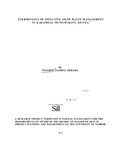Determinants of effective solid waste management in Kakamega Municipality, Kenya

View/
Date
2012Author
Nyayiemi, Samwel K
Type
ThesisLanguage
en_USMetadata
Show full item recordAbstract
Management of increasing amounts of solid waste has become a major challenge in many cities in developing countries. Municipalities are spending significant resources to address this problem, but the overall situation is far from satisfactory and rapid and haphazard urban growth is making the problem worse. In developing countries, municipal solid waste contains on average around 50% organic matter and 30% recyclable materials, meaning that potentially 80% of waste can be recycled. The purpose of this study was to establish the determinants of effective Solid Waste Management in Kakamega Municipality, Kenya and explore opportunities for waste reduction and recycling.
The study had the following objectives: to examine how economic factors influence effective Solid Waste Management in Kakamega Municipality; to establish the extent to which technical factors influence effective Solid Waste Management in Kakamega Municipality; to determine how institutional factors influence effective Solid Waste Management in Kakamega Municipality and to establish how social factors influence effective Solid Waste Management in Kakamega Municipality. The study employed descriptive survey research design whose purpose was to determine Municipality Solid Waste (SWM) management challenges of Kakamega Municipality in Kenya.
The target population consisted of all four respondents from NEMA, 62 employees from Kakamega Municipality, 40 employees from Ministry of Public Health and Sanitation and 16 employees from the Ministry of Housing (MOH), since a census study was carried out. The respondents were selected through cluster sampling and purposive sampling techniques. The research instruments used were the questionnaire and an interview schedule. On the validity of the instruments, the researcher used content validity while pilot testing process was used to test reliability of the research instruments comparing with a Pearson product moment of 0.5. The researcher then analysed the data and presented the results in form of frequency tables.
The study found out that economic factors had low levels and this led to inefficient effective Solid Waste Management in Kakamega Municipality. Technical factors had marginal associations on the effectiveness of effective Solid Waste Management. Institutional factors like municipality's lack of public awareness on SWM, the municipal council's lack of a policy on waste reduction at the source and on involving community groups and lack of clear authorities and sanitation rules negatively and significantly influenced the effectiveness of effective Solid Waste Management.
Social factors such as social conditions of social workers, stakeholders' participation and distance of dumpsite/container and deep rooted corruption in the councils that made it hard to follow the stiputed environmental laws by NEMA negatively and significantly influence effectiveness of effective Solid Waste Management on effective Solid Waste Management.
The study therefore made the following recommendations: the government should allocate enough finances for provision of SWM services within municipality and to increase the MSW's capacity to manage waste from a larger number of hotels, more employees need to be hired for collection, sorting, compo sting and management. Educational activities such as the organisation of conferences, seminars and workshops, publication of training manuals, case studies and best practices, and provision of technical and financial assistance should be conducted. The findings of this study may be useful to the Ministry of Health, academicians, researchers and other stakeholders in Ministry of Health in their improvement of policies and practice
Publisher
University of Nairobi, Kenya
